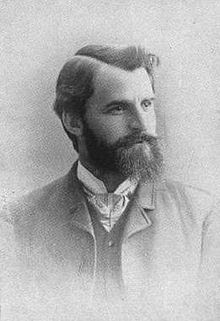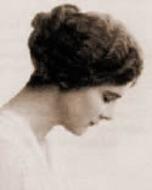
Hamlin Garland September 14, 1860 - March 4, 1940
Born in West Salem, Wisconsin, Hamlin Garland, novelist, short story writer, poet, biographer, lecturer, socialist, won the Pulitzer Prize in 1922 for biography.
His fascination with the West led him to travel from indian lands to the Klondike, soaking up information and color that he was to use in his writing.
One of Garland's contributions to late nineteenth-century literary theory was his coinage of the term "veritism" to describe his method of composing fiction. In his essay "Literary Prophecy," Garland states:
The realist or veritist is really an optimist, a dreamer. He sees life in terms of what it might be, as well as in terms of what is; but he writes of what is, and, at his best, suggests what is to be, by contrast. He aims to be perfectly truthful of his relation to life, but there is a tone, a color, which comes unconsciously into his utterance, like the sobbing stir of the muted violins beneath the frank, clear song of the clarinet. . . .
Poetry by Hamlin Garland:
A Wish
All day and many days I rode,
My horse’s head set toward the sea;
And as I rode a longing came to me
That I might keep the sunset road,
Riding my horse right on and on,
O’ertake the day still lagging at the west,
And so reach boyhood from the dawn,
And be with all the days at rest.
For then the odor of the growing wheat,
The flare of sumach on the hills,
The touch of grasses to my feet
Would cure my brain of all its ills,—
Would fill my heart so full of joy
That no stern lines could fret my face.
There would I be forever boy,
Lit by the sky’s unfailing grace.
In the Grass
O to lie in long grasses!
O to dream of the plain!
Where the west wind sings as it passes
A weird and unceasing refrain;
Where the rank grass wallows and tosses,
And the plains’ ring dazzles the eye;
Where hardly a silver cloud bosses
The flashing steel arch of the sky.
To watch the gay gulls as they flutter
Like snowflakes and fall down the sky,
To swoop in the deeps of the hollows,
Where the crow’s-foot tosses awry,
And gnats in the lee of the thickets
Are swirling like waltzers in glee
To the harsh, shrill creak of the crickets,
And the song of the lark and the bee.
O far-off plains of my west land!
O lands of winds and the free,
Swift deer—my mist-clad plain!
From my bed in the heart of the forest,
From the clasp and the girdle of pain
Your light through my darkness passes;
To your meadows in dreaming I fly
To plunge in the deeps of your grasses,
To bask in the light of your sky!
In August
From the great trees the locusts cry
In quavering ecstatic duo—a boy
Shouts a wild call—a mourning dove
In the blue distance sobs—the wind
Wanders by, heavy with odors
Of corn and wheat and melon vines;
The trees tremble with delirious joy as the breeze
Greets them, one by one—now the oak
Now the great sycamore, now the elm.
And the locusts in brazen chorus, cry
Like stricken things, and the ring-dove's note
Sobs on in the dim distance.
Indian Summer
At last there came
The sudden fall of frost, when Time
Dreaming through russet September days
Suddenly awoke, and lifting his head, strode
Swiftly forward—made one vast desolating sweep
Of his scythe, then, rapt with the glory
That burned under his feet, fell dreaming again.
And the clouds soared and the crickets sang
In the brief heat of noon; the corn,
So green, grew sere and dry—
And in the mist the ploughman's team
Moved silently, as if in dream—
And it was Indian summer on the plain.
Sport
Somewhere, in deeps
Of tangled, ripening wheat,
A little prairie-chicken cries—
Lost from its fellows, it pleads and weeps.
Meanwhile, stained and mangled,
With dust-filled eyes,
The unreplying mother lies
Limp and bloody at the sportsman's feet.
--Hamlin Garland
